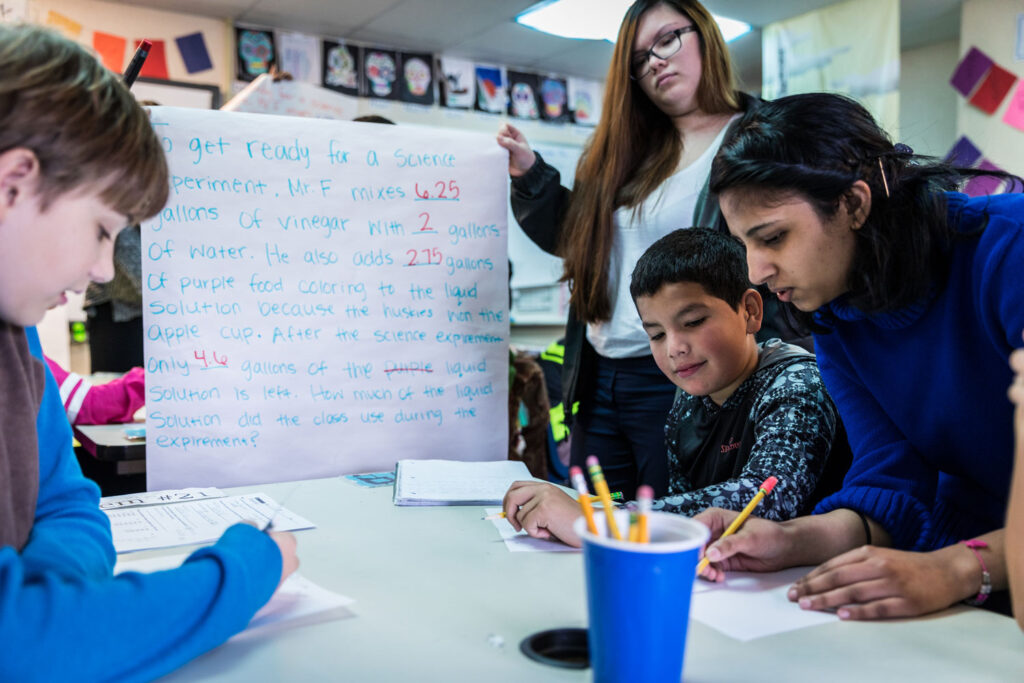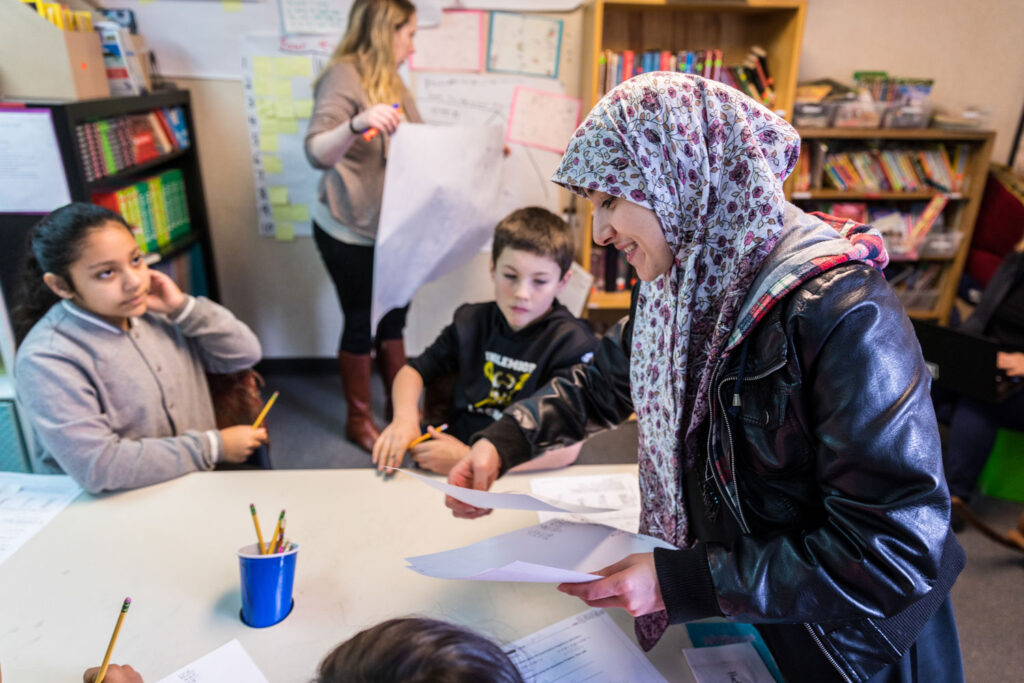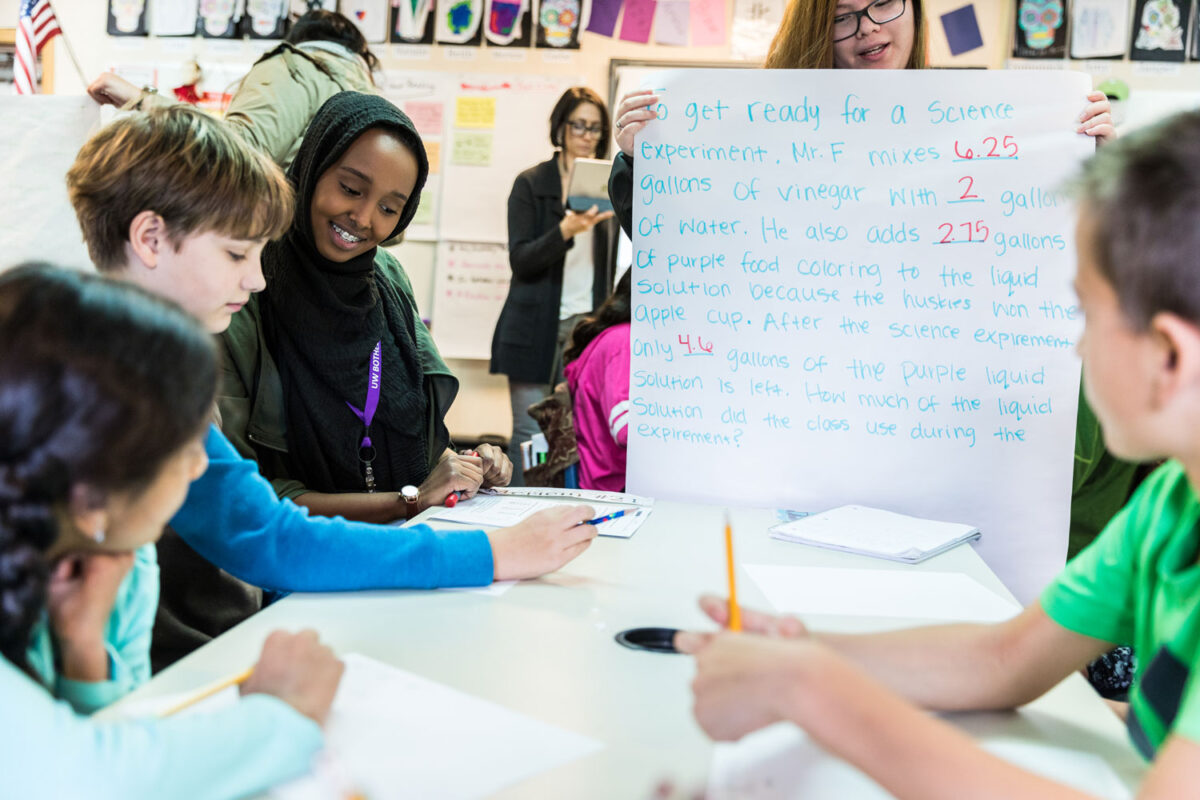Being a teacher is often what comes to mind first when people think of career opportunities in education. Career pathways in and around education, however, are numerous and intersect with all areas of society. From child psychology to social justice work, the possibilities can be endless.
To better support students looking to work in education or to enhance another area of their studies, the University of Washington Bothell’s School of Educational Studies launched two new minors in autumn 2024. The Child & Youth Development Minor and the Educational Advocacy & Community Engagement Minor both offer a new lens for education work in and out of the classroom.
“SES is very excited about these programs and the ways that we are going to meet the needs of our students — and welcome a whole new group of students to our school,” said Amy Couto, associate director of academic services for the school. “These programs not only enhance what we have to offer in SES but also meet the interdisciplinary interests of the UW Bothell campus community at large.”
Meeting student needs
Couto has had a pulse on the needs of the SES student community ever since her role as an academic adviser, when she worked closely with students to help them chart a course for success and ensure they were on track to meet their academic and professional goals.
One of the most important aspects of this work, Couto said, was listening to students and recognizing emerging wants and needs for new programming.
“I would hear from a lot of students who were explicitly interested in working in education, but they didn’t really see themselves as K-12 teachers,” she said. “I worked with students across all sorts of different majors and saw all these different areas where education touches. There’s really a wide swath of careers and industries where having a background in education can be helpful in rounding out a student’s qualifications and really enriching their academic career.”
Through her conversations with students, Couto noticed several patterns emerging for the type of education-adjacent jobs that were of interest. She shared these recurring themes with faculty and worked in partnership with them as new programming was developed. From this work, the two new minors were born.
“Thinking about college as a time of exploration and of trying and understanding new things, I think both these minors offer some fantastic ways to get your feet wet without fully jumping in and declaring education for a major,” said Dr. Sarita Shukla, associate teaching professor in SES. “I think it’s important to highlight that when we think about education we want to think more expansively, and the possibilities are limitless as to how students can apply this learning. I’m super excited to see how they will experience these minors.”

Molding young minds
In listening to students, one of the common themes that Couto and others noted was a strong desire to work with young children and families outside of the K-12 space. From working as a school guidance counselor to developing educational video games for children, there are many careers that can benefit from a deeper knowledge of children and adolescents.
The Child & Youth Development Minor looks to fill that need. It focuses on human growth and development processes and theories from infancy through adolescence, with an additional emphasis on working against inequity in educational and community contexts.
We see education as intersecting so much of what happens on campus, and there is space in these minors for students from all disciplines to really broaden their perspectives.
Amy Couto, associate director of academic services, SES
Junior Karlo Rodriguez said the minor complements his Educational Studies major and his desire to become a teacher specializing in technology education.
“As I want to pursue a career in teaching, I want to be able to learn more about how I can support the youth community while also improving how I teach in a classroom environment,” Rodriguez said. “My hope is that this minor, paired with my major, will allow me to teach students how to use technology. This is by creating a curriculum that recognizes that everyone learns a different way, while promoting an equitable class environment where everyone can learn without judgment.”
For Anika Anderson, a junior double majoring in Science, Technology & Society and in Psychology, the minor offers a different path outside the classroom to becoming a psychologist.
“I have always been interested in how children develop based on their environment, the people around them and what they witness growing up,” she said. “This minor lets me learn about different ages and how they function, what their brain is like, what impacts them, and more. I want to be able to help kids who grew up in a bad environment, which goes hand in hand with my psychology major.”
Supporting social justice
Another area where Couto noticed a strong interest from students was in educational advocacy work.
“We know that there’s a lot of students who view education as a means for social justice work,” she said. “The Educational Advocacy & Community Engagement Minor is perfect for students who see the intersection of their major and education as a path for creating social change.”
This minor, Shukla noted, leverages much of the existing curriculum and foundational values of the School of Educational Studies, where social justice and community engagement are integral to how the school functions and instructs on education.
The program focuses on critical perspectives of education history and policy and explores the tensions between education and social justice. Through reflection and community-engaged work, students in this minor will develop leadership skills to nurture partnerships with individuals, families and communities, preparing them to amplify community voices and advocate for social change.
“This minor really helps students to think about what it looks like to do collaborative work and to understand others’ perspectives when it comes to advocacy and pushing for policies that benefit multiple communities,” said Dr. Nathanie Lee, assistant teaching professor in SES. “I think for students, especially those in majors who want to think about policy change and doing transformative work in their fields, this minor is going to be really beneficial.”

Finding the right path
One of the core values of SES, Couto noted, is to minimize the barriers to joining and participating in educational curriculum. As such, these new minors do not require any prerequisites, and students are encouraged to take classes that interest them whether they’ve officially declared a minor or not.
“We see education as intersecting so much of what happens on campus, and there is space in these minors for students from all disciplines to really broaden their perspectives,” she said. “It’s exciting to see students realize when their interests align with education and the work they can achieve through education. We encourage students to explore our courses and see how these minors can support them in their academic and professional journeys.”
For any students interested in learning more about these new minors, Couto recommends they speak with their adviser to see what courses and programs are a good fit for their needs.
More information can be found on the Educational Studies webpage.




